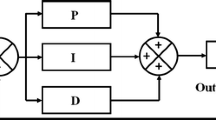Abstract
Proportional-integral-derivative (PID) control is commonly used in industrial automatic control systems. However, it is not straightforward to determine control gains in a PID controller for satisfactory closed-loop performance. Many research works have been devoted to the auto-tuning of PID control gains. In contrast to previous studies, this paper develops an auto-tuning rule for PID controllers to simultaneously satisfy specifications of both steady-state error and relative stability, in which stability is specified in terms of phase margin. To illustrate the proposed auto-tuning rule, a focus servo of an optical disk drive is used, in which a voice coil motor drives a lens to focus a laser beam on a data layer of an optical disk. Experimental results show the effectiveness of the proposed PID auto-tuning process.







Similar content being viewed by others
References
Kireçci A, Eker I (2006) Hybrid control for robotic manipulators. Proc Inst Mech Eng Part I J Syst Control Eng 220(2):81–89
Lu YS, Li YT, Liu SH (2017) Initial-value compensation of a PID controller for non-overshooting motion. Proc Inst Mech Eng Part I J Syst Control Eng 231(8):626–637
Vuppu GKRP, Venkata SM, Kodati S (2015) Robust design of PID controller using IMC technique for integrating process based on maximum sensitivity. J Control Autom Electr Syst 26(5):466–475
Astrom KJ, Hagglund T (1994) PID controllers: theory, design and tuning. Instrument Society of America, Durham
Garelli F, Mantz RJ, De Battista H (2010) Multi-loop two-degree-of-freedom PI controllers with adaptive set-point weighting. Proc Inst Mech Eng Part I J Syst Control Eng 224(8):1033–1039
Vinuela EB, Bradu B, Martinez RM et al (2015) PIDTUNE: a PID autotuning software tool on UNICOS CPC. In: Proceedings of the international conference on accelerator and large experimental physics control systems, 17–23 Oct 2015. Melbourne, pp 22–25
Zeng D, Zheng Y, Luo W et al (2019) Research on improved auto-tuning of a PID controller based on phase angle margin. Energies 12:1704
Yin JM, Shin JS, Lee HH (2009) On-line tuning PID parameters in an idling engine based on a modified BP neural network by particle swarm optimization. Artif Life Robot 14(2):129–133
Han KY, Lee HH (2011) Neuro PID control of power generation using a low temperature gap. Artif Life Robot 16(2):178–184
Govindan P (2020) Evolutionary algorithms based tuning of PID controller for an AVR system. Int J Electr Comput Eng 10(3):3047–3056
de Moura JP, da Fonseca Neto JV, Rêgo PHM (2019) Models for optimal online tuning based on computational intelligence of PID controllers applied to operational processes of bulk reclaimers. J Control Autom Electr Syst 30(2):148–159
Ahmad S, Ali S, Tabasha R (2019) The design and implementation of a fuzzy gain-scheduled PID controller for the Festo MPS PA compact workstation liquid level control. Eng Sci Technol Int J. https://doi.org/10.1016/j.jestch.2019.05.014
Lu YS, Cheng CH (2020) Auto-tuning of PID controllers for satisfying specifications of both steady-state error and relative stability. In: Proceedings of the international symposium on artificial life and robotics, 22–24 Jan 2020. Beppu, pp 188–191
Acknowledgements
This work was supported by the Ministry of Science and Technology, Taiwan [grant no. MOST 109-2221-E-003-022].
Author information
Authors and Affiliations
Corresponding author
Additional information
Publisher's Note
Springer Nature remains neutral with regard to jurisdictional claims in published maps and institutional affiliations.
About this article
Cite this article
Lu, YS., Tsai, TS., Huang, CC. et al. PID auto-tuning for simultaneously fulfilling the requirements of relative stability and steady-state error. Artif Life Robotics 26, 162–168 (2021). https://doi.org/10.1007/s10015-020-00661-z
Received:
Accepted:
Published:
Issue Date:
DOI: https://doi.org/10.1007/s10015-020-00661-z




